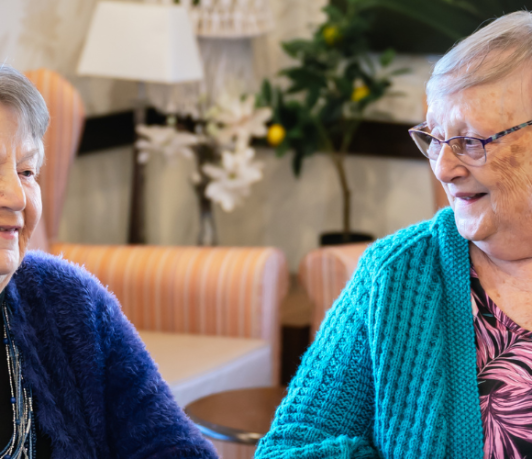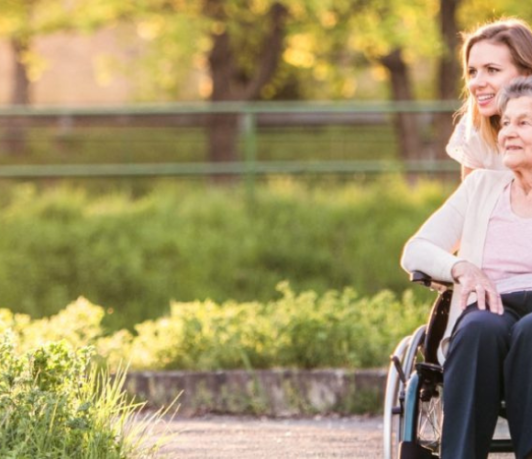What is Dignity of Risk and How it Impacts Your Choices
Aged Care, Health & Wellness, Home Care |

Particularly in our senior years, the decisions we make around our care and wellbeing become increasingly significant. For some older Australians, these decisions can sometimes feel overwhelming, especially when contemplating the potential need for further care, whether at home or in aged care homes.
Amidst these choices lies a fundamental principle that profoundly impacts our approach to care: the dignity of risk. Understanding this concept is not only crucial but empowering, as it allows us to make informed decisions that honour our autonomy and uphold our quality of life.
What is the dignity of risk?
The ‘dignity of risk’ is a principle deeply rooted in respecting individuals’ autonomy and self-determination, particularly in the context of aged care and home care. Essentially, it acknowledges that every person has the right to take risks and make decisions, even if those decisions may lead to undesirable outcomes. It recognises that a life without risk can limit growth, fulfillment, and independence.
In practical terms, embracing the dignity of risk means allowing older Australians to make choices about their daily lives, including decisions regarding their care, activities, and lifestyle. It emphasises the importance of striking a balance between safety concerns and the individual’s right to autonomy, dignity, and personal preferences.
Dignity of risk in aged care
In Australia, the concept of dignity of risk is deeply intertwined with the principles of person-centred care, which form the foundation of aged care services delivery. Person-centred care represents a significant shift from traditional, provider-driven models of care to a more personalised approach that prioritises you or your loved one’s needs, preferences, and goals.
Whether opting for home care or transitioning to an aged care home, you have the right to actively participate in decisions about your care and support services. This could entail selecting preferred caregivers, determining the types of assistance required, or even choosing the activities you wish to engage in.
If you’re receiving home care, dignity of risk means having the freedom to maintain a sense of independence and control over your daily lives. This can involve making choices about how support services are delivered, such as the timing of visits, the tasks requiring assistance, and the level of involvement in care planning.
Similarly, if you’re living in an aged care home, you should be afforded the opportunity to take reasonable risks that align with your preferences and values. This may involve decisions relating to social interactions, participation in recreational activities, or even your choices around your diet and lifestyle.
The impact of dignity of risk on choices
Embracing the dignity of risk can have profound implications for older Australians and their families. By honouring individuals’ autonomy and choices, it fosters a sense of empowerment, dignity, and wellbeing.
If you’re contemplating seeking further care, understanding the concept of dignity of risk can empower you to actively participate in decisions about your future. Instead of potentially feeling like passive recipients of care, you can become an active agent in shaping your own life, and retain a sense of control and independence.
Moreover, dignity of risk encourages a departure from a more ‘paternalistic’ approach to care, where decisions are made on behalf of older adults without considering their input or preferences. Instead, it promotes a collaborative relationship between care providers, older adults, and their families, where decisions are made collectively, taking into account the individual’s wishes and desires.
Empowering choices in home care
For many older Australians, receiving care within the comfort of their own homes through home care services is a preferred option. Home care offers a sense of familiarity and independence, allowing you or a loved one to maintain your routines and stay connected to the community.
However, ensuring that dignity of risk is respected within the context of home care requires a collaborative effort between clients and their caregivers and service providers.
Dignity of risk in home care
In home care, dignity of risk takes on a particularly significant role. Clients who receive home care services have the opportunity to exert a greater degree of control over their daily lives compared to those in residential care settings. However, this autonomy also comes with responsibilities, both for the clients and their caregivers or service providers.
Collaborative decision-making
The foundation of upholding dignity of risk in home care lies in collaborative decision-making. Clients and their caregivers or service providers should engage in open and transparent communication to ensure that care plans are tailored to the individual’s preferences, needs, and goals. This collaborative approach allows clients to express their desires and make informed choices while also considering any potential risks involved.
One of the ways to ensure that dignity of risk is respected is through client-centred care planning. This involves actively involving the client in the development of their care plan, rather than imposing a one-size-fits-all approach. Clients should be encouraged to express their preferences regarding the timing and frequency of care visits, the tasks they require assistance with, and any specific cultural or religious considerations.
Risk assessment and management
While respecting dignity of risk is important, it’s also crucial to conduct thorough risk assessments to ensure the safety and well-being of the client. Caregivers or service providers should work closely with clients to identify any potential risks associated with their care plan and develop strategies to mitigate these risks while still honouring the client’s autonomy.
Continuous monitoring and review
Dignity of risk in home care is not a one-time consideration but an ongoing process. Care plans should be regularly reviewed and adjusted based on the client’s changing needs and preferences. Clients should feel empowered to voice any concerns or changes they wish to make to their care plan, knowing that their input will be respected and acted upon.
In summary
Embracing dignity of risk helps allow us to ensure older Australians retain their autonomy, dignity, and quality of life. By empowering individuals to make informed choices about their care, we uphold their fundamental right to self-determination and independence.
If you or a loved one is considering home care or aged care services, it’s important to understand the significance of dignity of risk. By doing so, we collectively foster environments that respect and celebrate the uniqueness of everyone, enriching their lives and promoting holistic wellbeing.
We’re here to support
Ready to receive hassle-free in-home care support? Grab our free report for a step-by-step guide to accessing a Home Care Package (HCP), understanding costs, and a must-have handy home care checklist. Take the first step toward care at home — download now for free.
Got questions or like to receive more support? Please reach our care at home advisors or call us on 1300 144 144 and choose “home care” as a service option.

Book your free no-obligation consultation today
Simply fill in the below form and one of our Home Care Advisors will give you a call within 48 hours to discuss your home care options.
Would you rather talk to us? Give us a call on 1300 144 144




